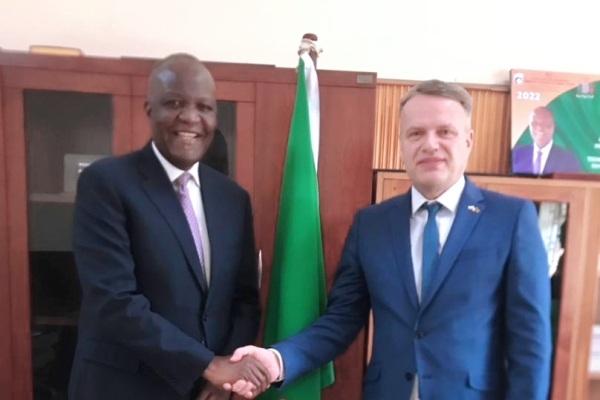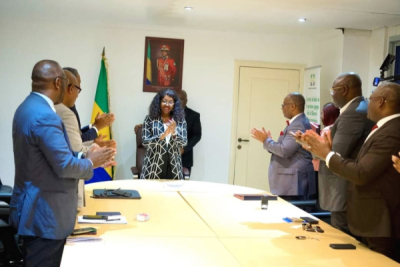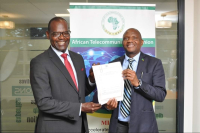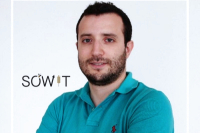In a context marked by a thriving tourism industry in Africa, the solution was developped by two Kenyan tech entrepreneurs to streamline travel agency operations and enhance the overall traveler experience.
Triply is a digital solution created by a Kenyan startup that enables travel agencies to manage their operations through a unified platform. It assists travelers in organizing business trips or vacations. Founded in 2021 by Peter Wachira and Collins Muthinja, the startup is headquartered in Nairobi, Kenya.
"We help travel companies manage their online operations, collect payments, and access financial services, while increasing their bookings through our marketplace," the founders explain.
The solution features a mobile app available for both iOS and Android devices. Users can create accounts to access a range of features that support various businesses, including travel agencies, short- and long-term accommodation rental platforms, and event planning companies.
For businesses, Triply streamlines payment collection, messaging management, flight and hotel bookings, as well as customer identity and human resources management. It also includes a marketing management tool that allows clients to make strategic decisions by integrating with major social networks like Facebook, WhatsApp, and Instagram. Additionally, Triply provides specialized tools for payment collection and accounting management.
Travelers can book vacation accommodations and access travel packages and hotels through its web and mobile platforms. The start-up's financial tools facilitate payments in multiple currencies, simplifying transactions for travelers. In April 2024, Triply was selected to join the Winter 2024 cohort of the California-based accelerator Y Combinator.
Adoni Conrad Quenum
The Czech Republic has awarded 25 scholarships to Zambian professionals for studies in Information Technology, Artificial Intelligence, and Cyber Security, Zambia’s Minister of Technology and Science Felix Mutati announced on July 28.
Czech Ambassador Pavel Prochazka announced the scholarships, covering both Bachelor's and Master's degrees, during a meeting with Minister Mutati. He stressed the Czech Republic's commitment to partnering with Zambia's Ministry to enhance technical skills to bridge the digital divide.
The telecommunications sector is thriving in Gabon, which aspires to become a hub for ICT. The country is supported by partners whose assistance is crucial for achieving its ambitions.
On Wednesday, July 24, Gabon’s postal operator La Poste SA, and the Equatoguinean company Inverfin signed a memorandum of understanding to expand internet access in the tri-border area, which lies at the crossroads of Gabon, Equatorial Guinea, and Cameroon.
Backed by the gabonese ministry of communications, the partnership is the culmination of discussions that began last May during an Inverfin visit to Libreville. Inverfin proposed to fully fund La Poste SA's digital projects in the tri-border area. They also expressed interest in supporting the Economic Interest Group (GIE) Poste Télédiffusion Services Universels, established in February, in its efforts to expand telecom network coverage in underserved areas nationwide.
"La Poste SA, known for its expertise in covering underserved areas, will leverage its know-how to assist Inverfin in connecting this strategic region, thereby reducing the digital divide," stated the Ministry of Communication.
This collaboration comes as Gabon intensifies its initiatives to improve connectivity across the country. Poste Télédiffusion Services Universels is particularly committed to enhancing access to telephony and internet services in rural areas at low cost, aiming to bridge the digital divide by providing broader network coverage.
The partnership is expected to enable La Poste SA, whose development is currently weak according to the 2023 Integrated Index for Postal Development (2IPD) by the Universal Postal Union, to move closer to its objectives. It would also allow the 30% of the population still lacking access to audiovisual, telephony, and internet services to benefit from these essential services.
Samira Njoya
After completing his studies in Benin and Senegal, he ventured into entrepreneurship, focusing on financial technologies. He simplifies digital payments in West Africa, making transactions easier for everyone.
Aziz Yérima (photo) is a Beninese consultant specializing in card payment systems, marketing, and digital transformation. He is the co-founder and CEO of PayDunya, an innovative Senegalese fintech focused on digital payment solutions.
Founded in 2015 by Yérima, Youma Fall, Christian Palouki, and Honoré Hounwanou, PayDunya aims to tackle financial inclusion challenges in Africa. The startup offers a technology platform that enables businesses to accept payments securely and transparently, providing solutions tailored to the unique needs of the African market.
"Our PayDunya platform is designed to strengthen the African digital ecosystem by supporting the digital transformation of both formal and informal businesses, as well as financial institutions," Yérima explains. Currently, PayDunya operates in Senegal, Côte d’Ivoire, Benin, Burkina Faso, Togo, and Mali.
The concept for PayDunya emerged in 2013 when Yérima, then a student, participated in a project to aid a group of women in Pikine, Senegal. Encountering difficulties in integrating online payment solutions, he recognized the need for a payment system adapted to African realities.
In addition to his role at PayDunya, Yérima serves as the president of the SEN FINTECH association, which unites stakeholders in financial technology. This organization advocates for the interests of its members and represents them to regulators and other stakeholders in the fintech sector.
Yérima holds a bachelor's degree in electrical and computer engineering from the University Institute of Technology in Lokossa, Benin, which he obtained in 2011. He also earned a master's degree in multimedia networks in 2014 from the Ecole Supérieure Multinationale des Télécommunications in Dakar, Senegal. In 2016, he completed a training program on mobile money from GSMA (Global System for Mobile Communications).
Melchior Koba
Created by three tech entrepreneurs from Nigeria, it aims system to verify the authenticity of medications and food products. Its goal is to safeguard African consumers. Its founding team rapidly teamed up with the Nigerian National Agency for Food and Drug Administration and Control (NAFDAC) to implement their solution.
Chekkit is a health-tech solution created by a Nigerian startup that enables users to verify the authenticity of the medications they consume. Founded in 2018 by Dare Odumade, Tosin Adelowo, and Samuel Ukhueleigbe, the company operates out of Lagos, Nigeria, and Houston, Texas. In 2023, Chekkit secured an undisclosed amount of funding aimed at enhancing its technology and supporting its growth.
"...We develop unique technological products to protect the lives of millions and also directly improve the business operations for several brands by understanding consumers in the largely informal African markets," said Dare Odumade.
The solution features a mobile application available on both iOS and Android, which has been downloaded over 10,000 times, according to Play Store data. Users can access the app without creating an account. After downloading, they simply scan the QR code on the medication packaging. If the product is authentic, all manufacturing information and the expiration date will be displayed, helping to prevent the use of counterfeit and expired medications.
The application only authenticates products with labels from Chekkit. The start-up has established contracts with various companies across the continent to assist consumers in distinguishing authentic products from counterfeits. Notable partners include Indomie, Nivea, and Flour Mills of Nigeria Plc. These companies or their distributors are required to affix stickers with unique codes on their product packaging.
In addition to its core functionality, the Chekkit app allows users to participate in consumer surveys. Users can answer a series of questions and receive various rewards in return. They also have the option to file complaints against companies or pharmaceutical laboratories. In September 2022, Chekkit Technologies Corp was selected as one of thirty startups to participate in the Bill & Melinda Gates Foundation's Investing in Innovation (i3) program, culminating in a $50,000 grant.
Adoni Conrad Quenum
Africa Data Centres, a unit of Cassava Technologies, announced, on July 25, the expansion of its CPT1 facility in Cape Town.
Supported by a loan of up to $300 million from the U.S. International Development Finance Corporation (DFC), the project will add three new halls and increase the IT load by 6MW, doubling the current capacity.
The CPT1 expansion is part of Africa Data Centres’ strategy to increase data centre capacity across the continent, addressing the growing demand for data services in Africa.
Equipping African youth with cutting-edge skills is set to drive innovation and economic growth, creating opportunities for the youth to join the global workforce. These advancements are pivotal for driving inclusive growth and sustainable development in Africa.
Nigeria has partnered with Gluwa, a decentralized financial platform, to train 1,000 youths annually in artificial intelligence, blockchain, and other technologies. The country is poised to outpace global peers in both economy and technology, Vice President Kashim Shettima declared on July 23.
We are proud to partner with VP @KashimSM’s Presidency Office to train 1,000 Nigerian youths annually in artificial intelligence, blockchain, and other cutting-edge technologies, preparing them to contribute to the global workforce.
— Gluwa (@Gluwa) July 23, 2024
Through this collaborative AI Expertise… https://t.co/nLDZFVqPqA
The VP announced this while launching the AI Expertise Blockchain and Technology Training and Outsourcing Initiative in Dutse, Jigawa State, as part of the country's digital transformation strategy. He urged youths to embrace the program, calling it vital for Nigeria’s economic future.
“We are poised to overtake the rest of the world. This initiative offers its beneficiaries the chance to join a global workforce and drive innovation,” he said.
Shettima emphasized the federal government’s vision to create a network of tech hubs nationwide and lauded Gluwa for its significant impact. He highlighted the goal of transforming Nigeria into a premier destination for technology outsourcing, combining global expertise with local talent.
Nigeria has made significant progress in its digitization efforts. This move aligns with the National Digital Economy Policy and Strategy 2020 – 2030 (NDEPS), which aims to “transform the country into a leading digital economy providing quality life and digital economies for all.” Improving digital literacy and skills is one of the eight guiding pillars of the strategy, intending to reach a 95% digital literacy level by 2030.
Hikmatu Bilali
Improving regional cooperation leads to better connectivity across African countries. This connectivity is vital for economic growth, as it facilitates trade, communication, and access to information. Through such collaborations, African countries can leverage collective resources to foster economic growth.
Zambia has ratified the Constitution and Convention of the African Telecommunications Union (ATU), strengthening its commitment to advancing telecommunications and ICT development in Africa. The instruments of ratification were deposited at the ATU headquarters in Nairobi, Kenya, today July 26, and received by ATU Secretary General John Omo.
The Republic of Zambia... - African Telecommunications Union | Facebook
Alfred Musemuna, Zambia's Charge d'Affaires in Kenya, delivered the instruments on behalf of the Minister of Science and Technology, Felix Mutati. Musemuna conveyed Mutati's message, emphasizing Zambia's dedication to regional cooperation and connectivity. "Zambia recognizes the critical role of the ATU in promoting connectivity for the benefit of all African countries. We are excited to contribute to the Union’s goals of a digitally inclusive Africa," said Mutati.
Countries ratifying the ATU's foundational instruments gain benefits, including full engagement in Union activities, voting rights, eligibility for elections within the Union's Permanent Organs, and the ability to nominate candidates for elective roles.
“ATU is the leading continental organization fostering the development of information and communication technologies infrastructure and services.” With Zambia's ratification, 32 out of 52 African countries represented by ATU have now ratified or acceded to the Union's Constitution and Convention, initially signed by ATU Member States in 1999 and revised in 2014.
This step underscores Zambia's commitment to technological advancement and regional integration through active participation in international forums. As a member of the International Telecommunication Union (ITU), Zambia engages in the Regional Standardisation Forum for Africa. The country has also adopted several ITU conventions and guidelines, such as the Guidelines on Child Online Protection, which have been localized and implemented by the Zambia Information and Communications Technology Authority, as outlined in the National ICT Policy 2023 Republic of Zambia Implementation Plan 2022 - 2026.
Hikmatu Bilali
Visa is inviting women entrepreneurs in South Africa to apply for the She’s Next program. The program is offering over ZAR1 million (USD 54,540) in funding, along with mentorship and training, to help businesses grow and contribute to the South African economy.
Eligible businesses must be at least 51% woman-owned and 51% black-owned, operate in South Africa, have annual revenue under ZAR50 million (USD 2,728,000), and have been operating for at least one year before July 22, 2024.
Application closes by August 9.
As a data entrepreneur, he uses artificial intelligence and remote sensing to provide farmers and agricultural organizations with practical tools that help them make informed decisions.
Hamza Bendahou (photo) is a Moroccan entrepreneur specializing in technological services for agriculture. He is the co-founder of SOWIT, a startup that provides precise data to decision-makers in agriculture and environmental sectors.
Founded in 2017 by Hamza Bendahou and Hamza Rkha Chaham, SOWIT develops decision-support tools to assist African farmers. Their clients include food companies, governments, farmers, as well as banks and insurers. Through its platforms, SOWIT provides the necessary data for making informed decisions.
SOWIT offers six mobile applications: SoDry, SoYield, SoWater, Monitor, Fertisat, and Skowt. SoDry helps determine the optimal date for harvesting corn silage. SoYield uses artificial intelligence to provide production estimates up to two months before harvest. SoWater calculates the water needs of a plot to optimize irrigation.
Monitor allows access to a SOWIT expert for co-managing agricultural operations through weekly crop diagnostics based on satellite remote sensing. Fertisat determines the fertilizer needs of crops. Skowt improves inspection efficiency by guiding operators to sensitive areas and providing a comprehensive report.
Hamza Bendahou holds an engineering degree in electronics and signal processing, obtained in 2011 from INP-ENSEEIHT in Toulouse. He also graduated from the Institut Supérieur de l'Aéronautique et de l'Espace (ISAE-SUPAERO) with a master's degree in financial engineering in 2012.
After an end-of-year internship in Airbus' flight test department in 2011, Hamza Bendahou joined AXA Investment Managers in 2012, where he held positions as a fund range manager and product manager. From 2013 to 2018, he worked at Gras Savoye, a financial services company, as a market studies officer and later as head of the actuarial studies department.
Melchior Koba
More...
A computer science graduate, he applies artificial intelligence, the Internet of Things, and computer vision to develop new aquaculture technologies.
Mohamed Ben Ahmed (photo) is a Tunisian entrepreneur and computer scientist specializing in computer vision and artificial intelligence (AI) development. As the co-founder and CEO of Aquadeep, he uses technology to revolutionize the aquaculture sector.
Founded in 2021 by Mohamed Ben Ahmed and Youssef Chahed, Aquadeep is a tech startup aimed at facilitating aquaculture. The company develops AI and computer vision-based solutions to help aquaculturists count larvae and fish in their ponds. It also provides data extraction tools based on the Internet of Things (IoT) for better control of the farming process.
“We develop solutions based on artificial intelligence and computer vision, an AI technique that enables computers to see and interpret images and videos in the same way humans do,” explained Mohamed Ben Ahmed in July 2024.
Aquadeep's solutions help fisheries better control their yields, ensuring healthier fish farming and more efficient cost and stock management. The company offers a larval fish counter and a fully industrial juvenile fish counter. Additionally, it provides a mobile AI-based application that simplifies daily tasks for fishery employees.
Mohamed Ben Ahmed holds an engineering degree in computer science, obtained in 2021 from the South Mediterranean University in Tunisia. Before venturing into entrepreneurship, he worked as a hardware engineering intern at Cloud Temple in France in 2018. In 2020, he completed a full-stack developer internship in Tunisia at Think-it, a software engineering organization.
Melchior Koba
The digitization of public services in Burkina Faso is progressing steadily, affecting all sectors, including land management.
On Thursday, July 25, Burkina Faso's Minister of Digital Transition, Posts, and Electronic Communications, Aminata Zerbo/Sabane (photo, left), co-chaired the official launch ceremony of the Teng@ Topo platform alongside her counterpart, Minister of Urbanism, Land Affairs, and Housing, Mikaïlou Sidibe (photo, center).
This solution, managed by the Ministry of Urbanism, offers six main services: boundary requests, issuance of plan extracts, land identification, tracking of land requests, change of land use, and authorization for subdividing or restructuring land.
"I am greatly satisfied to see this project led by the ministry I oversee come to fruition. This platform is a valuable tool for the public and it underscores the government’s commitment to modernizing administrative services for the benefit of all Burkinabe citizens," stated Mikaïlou Sidibe.
The Teng@ Topo platform is part of the National Strategy for Public Administration Modernization (SNMAP) 2021-2025, aiming to digitize 100% of administrative procedures by 2025. As of February, the average rate of administrative procedure digitization was 83.97%, according to an evaluation by the Ministry of Digital Transition.
The launch of this new platform is expected to allow users to submit their requests online, saving time. They will also be able to track the progress of their requests without having to travel and receive the necessary documents directly online. This initiative will help reduce long queues in administrative offices, lower the costs associated with frequent travel, and improve the transparency of administrative processes. Additionally, by centralizing land information, it will facilitate access to data for urban planning and land professionals, as well as investors, while securing real estate transactions.
Samira Njoya
African nations are in the process of digitizing their services. To fully realize the benefits of these advancements for their citizens, a robust unique identification system is crucial.
The Burkina Faso government, during the ministerial council on Wednesday, approved a bill establishing an electronic unique identifier for all residents.
The system will use biometric and biographical data to create a unique code for every person living in the country, including citizens abroad and foreign residents. However, it will not replace existing identification documents.
“This unique identifier will strengthen the identification system, allow better management of population data, facilitate service delivery, and clean up sectoral identification databases,” said Minister of Digital Transition Aminata Zerbo/Sabane.
This initiative is part of the West Africa Unique Identification for Regional Integration and Inclusion (WURI) program. The project, active in six West African countries (Burkina Faso, Côte d'Ivoire, Benin, Niger, Togo, and Guinea) with financial support from the World Bank, aims to achieve digital identification for at least 85% of the population by 2026.
The implementation of this unique identifier will create an electronic code associated with every person living in Burkina Faso, as well as Burkinabè abroad and foreigners residing temporarily in the country. Besides ensuring the uniqueness of each individual, the unique identifier will be a key tool for inclusive growth. Public services such as social safety nets, healthcare, education, and businesses will be able to rely on this system to identify and authenticate their beneficiaries and clients.
Once adopted by the National Assembly, this law and the developing identification system are expected to contribute to the cleaning up of sectoral identification databases and ensure interoperability between these databases. This will resolve duplication issues and improve administrative efficiency.
Samira Njoya
Designed with the unique challenges of educational institutions in mind, this innovative solution aims to simplify operations.
Studirium is an edtech platform developed by a promising Cameroonian start-up. Founded in 2024 by Eric Bruno Tia Nossoue and based in Douala, the platform aims to digitalize the educational ecosystem for schools.
“Our product is a web and/or mobile application that securely records, generates, processes, manages, makes accessible to authorized personnel, and archives school data. This is to enhance school performance, increase parental oversight, and regularize private tutoring in Africa,” explains the startup.
Although the solution lacks a dedicated mobile application, users can access its services via a web browser. The process begins with school administrators filling out a form to add their institution, providing details such as the school name, structure, motto in French and English, and location.
Once the form is submitted, a start-up agent contacts the user to verify the school’s documents. If everything is in order, the account is activated. From the dashboard, administrators can manage various tasks, including pre-registration and transferring students between schools.
Since its launch, Studirium boasts 56 schools, 403 classes, and 12,612 learners. In 2024, it was selected as one of the ten startups to participate in the Cameroon stage of the Orange Social Entrepreneur Prize in Africa and the Middle East.
Adoni Conrad Quenum















